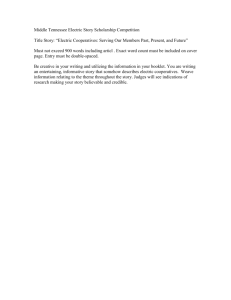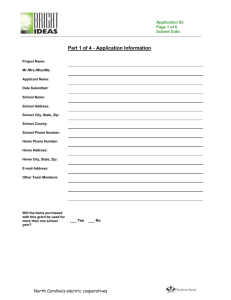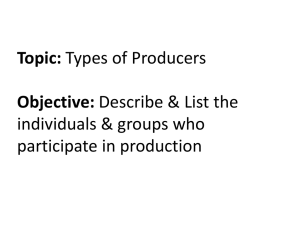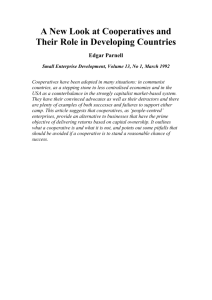Energy Efficiency and Conservation
advertisement
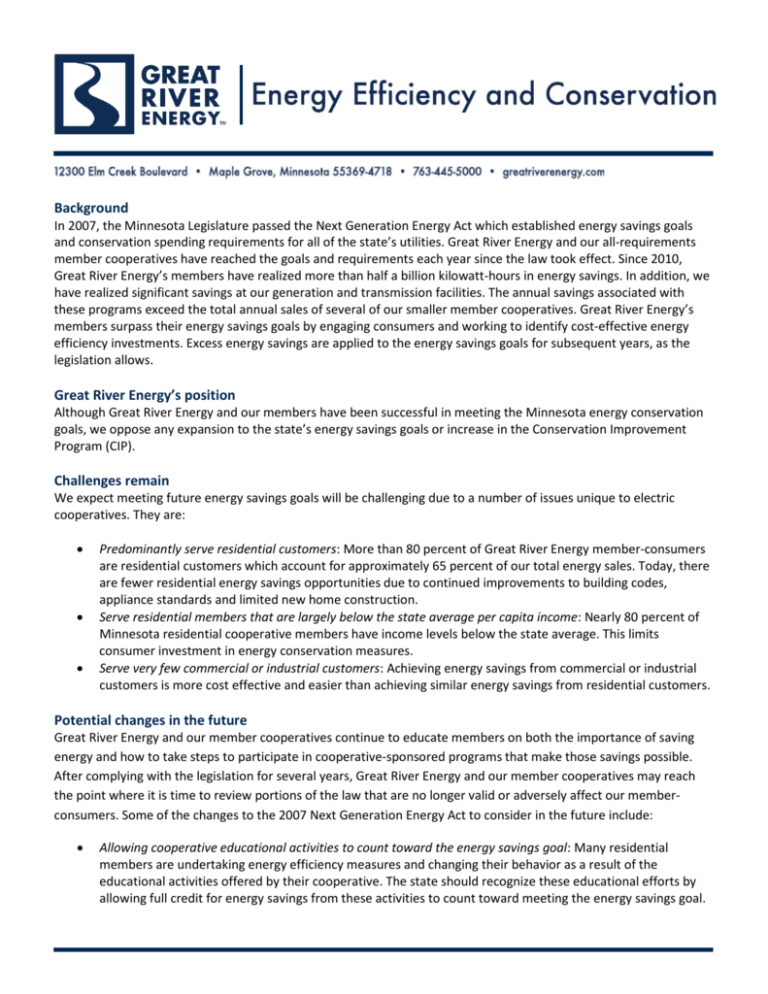
Background In 2007, the Minnesota Legislature passed the Next Generation Energy Act which established energy savings goals and conservation spending requirements for all of the state’s utilities. Great River Energy and our all-requirements member cooperatives have reached the goals and requirements each year since the law took effect. Since 2010, Great River Energy’s members have realized more than half a billion kilowatt-hours in energy savings. In addition, we have realized significant savings at our generation and transmission facilities. The annual savings associated with these programs exceed the total annual sales of several of our smaller member cooperatives. Great River Energy’s members surpass their energy savings goals by engaging consumers and working to identify cost-effective energy efficiency investments. Excess energy savings are applied to the energy savings goals for subsequent years, as the legislation allows. Great River Energy’s position Although Great River Energy and our members have been successful in meeting the Minnesota energy conservation goals, we oppose any expansion to the state’s energy savings goals or increase in the Conservation Improvement Program (CIP). Challenges remain We expect meeting future energy savings goals will be challenging due to a number of issues unique to electric cooperatives. They are: • • • Predominantly serve residential customers: More than 80 percent of Great River Energy member-consumers are residential customers which account for approximately 65 percent of our total energy sales. Today, there are fewer residential energy savings opportunities due to continued improvements to building codes, appliance standards and limited new home construction. Serve residential members that are largely below the state average per capita income: Nearly 80 percent of Minnesota residential cooperative members have income levels below the state average. This limits consumer investment in energy conservation measures. Serve very few commercial or industrial customers: Achieving energy savings from commercial or industrial customers is more cost effective and easier than achieving similar energy savings from residential customers. Potential changes in the future Great River Energy and our member cooperatives continue to educate members on both the importance of saving energy and how to take steps to participate in cooperative-sponsored programs that make those savings possible. After complying with the legislation for several years, Great River Energy and our member cooperatives may reach the point where it is time to review portions of the law that are no longer valid or adversely affect our memberconsumers. Some of the changes to the 2007 Next Generation Energy Act to consider in the future include: • Allowing cooperative educational activities to count toward the energy savings goal: Many residential members are undertaking energy efficiency measures and changing their behavior as a result of the educational activities offered by their cooperative. The state should recognize these educational efforts by allowing full credit for energy savings from these activities to count toward meeting the energy savings goal. • • Recognizing the value of electrifying energy efficient technologies that reduce carbon dioxide (CO2) emissions: Pending regulatory efforts to reduce CO2 emissions may encourage and promote energy efficient electric technologies that will result in consumers switching from fossil fuel-based resources to ones that use electricity, primarily from renewables. Shift focus from quantity of savings to system wide efficiency improvements: Energy efficient market transformation is occurring much more rapidly than when utility energy efficiency programs were originally conceived. Technological progress is being driven in part by federal legislation, new codes and standards, as well as manufacturer’s promotional efforts and numerous educational campaigns. Continuing to require utilities to meet efficiency requirements in the face of limited generation needs adds costs and limits the ability to make other system investments without further increasing consumers’ costs. Utility conservation efforts should shift the focus of these programs to demand and supply side technologies that deliver systemwide benefits, not simply working to meet arbitrary goals. Great River Energy and our member cooperatives will continue to make a good faith effort to meet future energy savings goals by educating consumers about the importance of saving energy and encouraging participation in energy efficiency programs. We will also continue to advocate for changes to the 2007 Next Generation Energy Act that better reflect the unique differences and challenges Minnesota cooperatives face in meeting the law’s goal. Great River Energy and our member cooperatives are widely respected for their energy conservation efforts and for helping consumers use energy wisely. We have more than 20 years of experience doing so, and plan to continue to encourage energy efficiency that is in the best interest of our members. Possible future revisions to the 2007 Next Generation Energy Act that acknowledge the unique challenges of the state’s electric cooperatives would help cooperatives meet future goals and protect them and their member-consumers from undue harm. March 17, 2015
